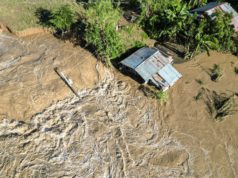It was one of the deadliest attacks on the army in recent years, and Indian officials quickly blamed a group based in Pakistan.
SRINAGAR, India — A brazen weekend attack by heavily armed militants who stormed an Indian Army base in the Jammu region killed at least 10 people, including five soldiers, army officials said on Sunday.
It was one of the deadliest attacks on the army in recent years, and Indian officials quickly blamed a Pakistan-based militant group.
The target of the attack early Saturday was the sprawling base of the army’s 36th Brigade, which houses more than 3,500 troops, including those of the Jammu and Kashmir Light Infantry.
Indian officials said the Pakistan-based militant group Jaish-e-Muhammad, led by Maulana Masood Azhar, was behind the attack. The group has carried out similar attacks in the Indian-administrated portion of Kashmir, particularly along the Line of Control that divides Kashmir into two parts, held by India and Pakistan.
There was no immediate claim of responsibility for the attack this weekend, however.
The attack began around 4:55 a.m. Saturday as four militants dressed in army uniforms and armed with AK-47 assault rifles and grenades descended on Chenni, a small village on the outskirts of Jammu City, said Abdul Rehman Veeri, the parliamentary affairs minister of the state of Jammu and Kashmir. The village is among those closest to the de facto border with Pakistan.
The militants entered the family quarters of the army officers, gunning down two soldiers and injuring at least nine other people, including women and children, army officials said.
The militants were cornered in a residential complex of the camp until the army deployed Special Forces that engaged in a bloody firefight that lasted more than 24 hours, an army spokesman in Jammu, Lt. Col. Devender Anand, said.
“The militants entered into the residential quarters where they targeted the family members of the army personnel. A junior commissioned officer and a noncommissioned officer were killed in the attack,” the police said.
The death toll stood at five soldiers, four militants and the father of a soldier, officials said.
“The operation is still in progress,” Colonel Anand said. “We are still evacuating the trapped family members of the forces.”
On Sunday, army helicopters hovered over the Sunjuwan military station, and the Indian Army chief, Gen. Bipin Rawat, arrived in Jammu, the winter capital of Jammu and Kashmir.
India’s home minister, Rajnath Singh, said from Delhi that he was monitoring the situation closely.
The latest attack is likely to raise tensions between India and Pakistan, which have fought three wars since independence, two of them over Kashmir. New Delhi has often blamed militant groups in Pakistan for sponsoring militant attacks in the region.
Attacks on army bases have become common in the disputed region after the Indian Army killed a charismatic militant leader, Burhan Muzaffar Wani, in July 2016. Protests in the predominantly Muslim valley have increased since then. And more people have joined the fight against Indian rule.
Jammu City is in the southern part of Kashmir Valley, at the heart of the dispute between the two nuclear-armed neighbors.
More than 200 militants were killed last year, the largest number in seven years, according to the director general of the Jammu and Kashmir police, Shesh Paul Vaid. And the chief minister of the state, Mehbooba Mufti, said last week in the State Assembly that 71 civilians and 49 police officers had been killed over the past two years.
The police chief for Jammu, Shiv Dev Singh Jamwal, told reporters on Saturday that a sentry had noticed suspicious movement near the camp before the assailants began firing.
“A high alert has been sounded in Jammu, and security beefed up in and around the city,” he said.
The state government closed schools and several shopping complexes within a three-mile radius of Chenni and the military station.
Mohammad Ashraf Mir, whose son was one of the soldiers killed in the attack, said, “He died serving his nation.”
The father, a resident of Kupwara, in northern Kashmir, said: “People are getting killed every day. India and Pakistan should come together and resolve there differences.
“Today it is my son; tomorrow it will be someone else’s,” he added. “Something should be done to stop this bloodshed immediately.”






